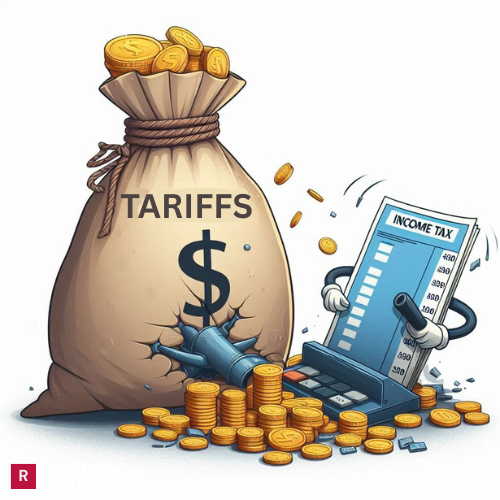President Donald Trump has made a bold and surprising statement that’s getting a lot of attention. In a recent interview, Trump said there is a “real chance” that money made from tariffs — which are taxes on imported goods — could one day replace the need for Americans to pay income taxes.
Trump pointed to history as proof. He said that between 1870 and 1913, the U.S. government made most of its money from tariffs. During that time, there was no income tax, and Trump says the country was “relatively the richest.” He mentioned that in the 1880s, a special committee was even formed to figure out how to handle all the extra money the government was collecting.
He believes that the U.S. can go back to that system. “There’s a real chance,” Trump said. “The money from tariffs could be so great that it would replace income tax.”
Trump also pushed back against people who blame tariffs for causing the Great Depression in the 1930s. He said that the economic crash happened before big tariffs were introduced, not because of them.
China Faces Crushing 245% Tariffs in Trade War With the U.S.
Billions Claimed from Tariffs Under Trump’s Watch
During the interview, Trump claimed that his administration was making “two billion and three billion dollars a day” through tariffs. “We never made money like that,” he said. These large amounts, according to him, show how strong tariffs can be as a source of government income.
He also said that while there has been a temporary cut in some tariffs to help businesses adjust, the overall strategy hasn’t changed. The U.S. is still using high tariffs on certain countries, especially China. In fact, the tariff rate on some Chinese products has been raised to a massive 245 percent.
At the same time, the Trump administration has launched a 90-day pause on some of the previously imposed tariffs. This pause applies to certain countries as part of ongoing trade talks. The goal is to create deals that are better for the American economy and to reduce the country’s trade deficit — which is when the U.S. buys more from other countries than it sells to them.
Officials say the plan is to make the U.S. economy stronger by getting better deals and making sure other countries don’t take advantage of American workers and businesses.
Trump Targets Key Minerals Used in Phones and Missiles
Trump Talks Tough on Crime and Foreign Prisons
President Trump also spoke about crime in the U.S. and shared his admiration for El Salvador’s President, Nayib Bukele. Trump praised Bukele’s strict crime policies and the country’s huge prison system that has been used to lock up thousands of gang members.
Trump said that the U.S. could learn from El Salvador’s approach. He even said he would be open to the idea of sending violent American criminals to foreign prisons like those in El Salvador. “He’s made it a very safe place,” Trump said about Bukele’s actions.
When asked if American offenders — including what he called “homegrown” criminals — could also be sent to these foreign prisons, Trump did not say no. He suggested that it could be an option.
Trump also repeated his claim that the U.S. has become less safe because of President Joe Biden’s policies, saying that criminals had been “allowed to come in” under Biden’s leadership. Now, he said, “we are getting rid of our criminals.”
These remarks were made while the administration continues to adjust its tough trade policies and push forward on controversial crime-related proposals.


